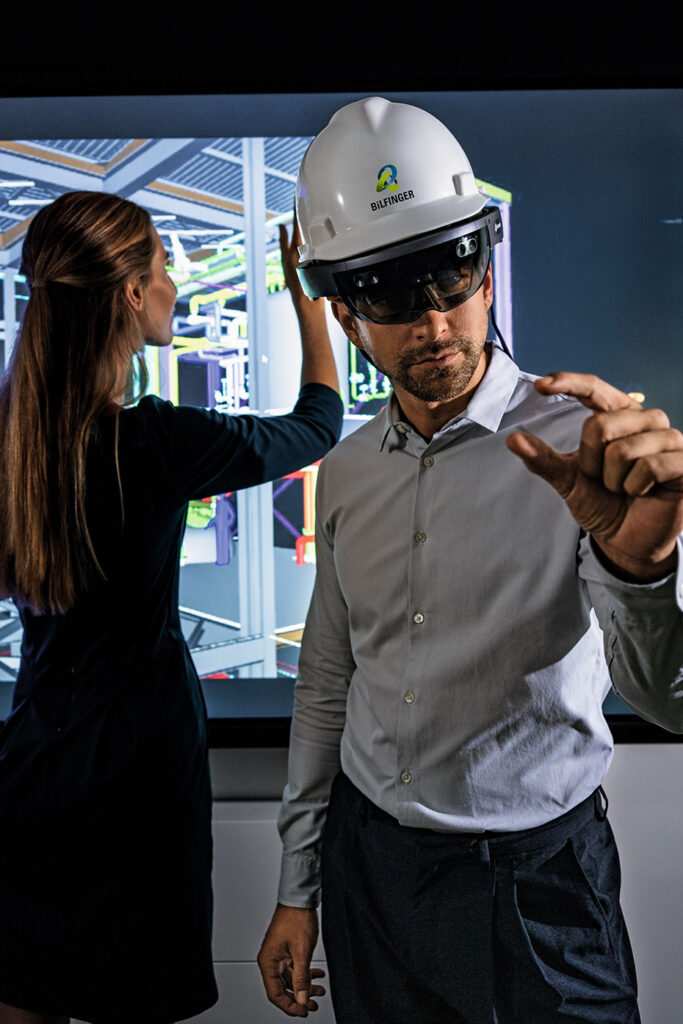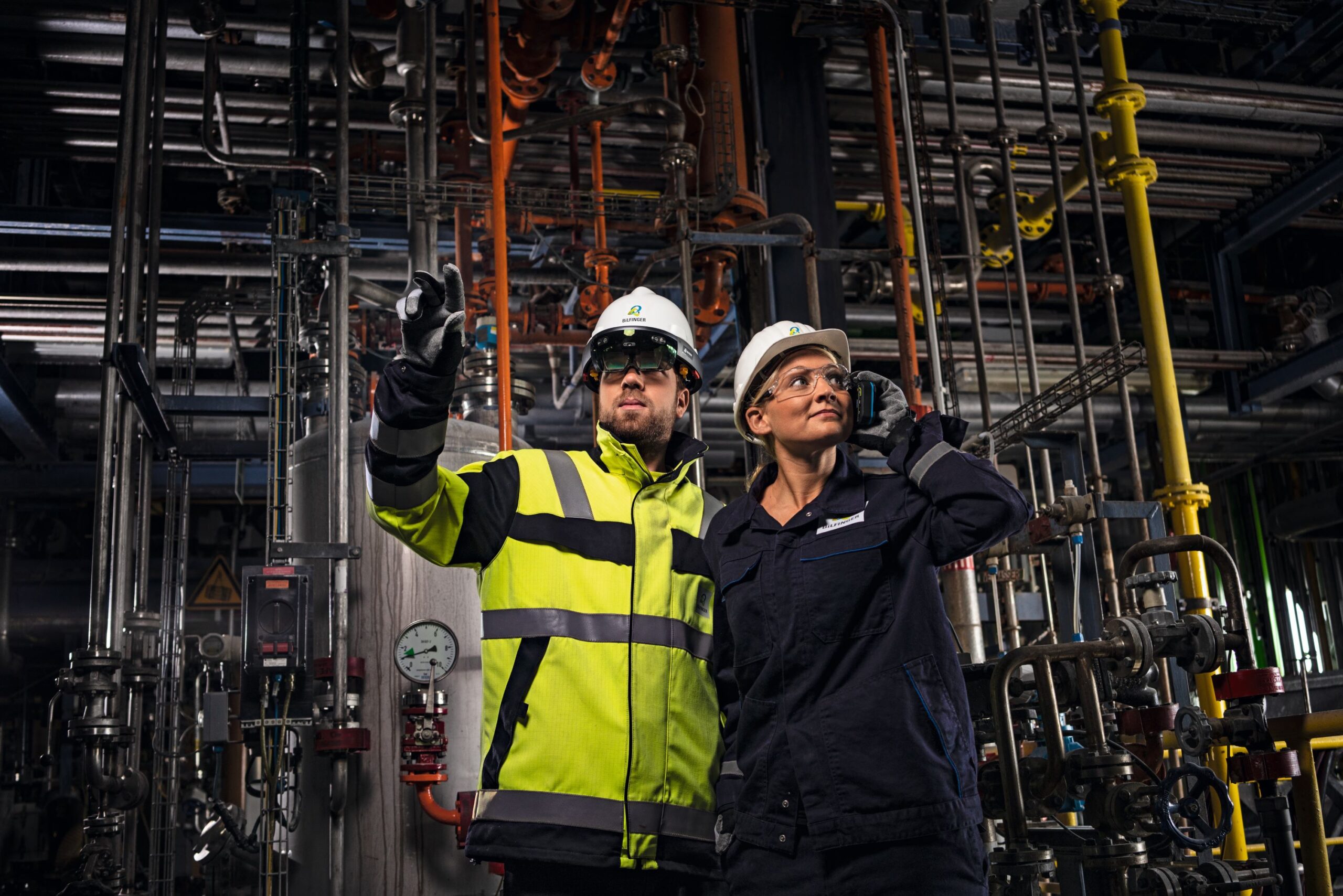Industrial Plant Planning with a Wow Effect
Bilfinger Engineering & Maintenance has been successfully using Augmented Reality (AR) in industrial plant engineering since 2019. AR allows customers and stakeholders to be seamlessly integrated into the design process and avoids costly errors at an early stage.
It’s just a gimmick for large projects. We don’t need anything from another galaxy to operate our plant. Tobias Bauchrowitz, Head of Engineering at Bilfinger Engineering & Maintenance, is familiar with the prejudices that new technologies like Augmented Reality often encounter: “I sensed that customers were a bit skeptical at first, but then the visualization usually speaks for itself.”
With over 3,000 employees, Bilfinger Engineering & Maintenance GmbH plans, maintains, repairs and monitors plants in the process industry. The company is an industrial services market leader and a pioneer in the digitalization and optimization of processes for customers and the workforce.
“Our aim is to meet customer needs and to provide decision-makers with the right information. Especially in the engineering sector, we saw a lot of potential for making planning and development processes more customer-friendly and efficient with Augmented Reality.”
Tobias Bauchrowitz, Leiter Engineering bei Bilfinger Engineering & Maintenance
Requirements for AR Software
Previously, Bilfinger Engineering & Maintenance had traditionally developed 3D models with its stakeholders and customers for new construction, conversion or plant modernization projects, either directly in the CAD software or via 3D PDF. “If 3D models are mapped on a two-dimensional plane, the spatial understanding can be deceptive, especially if the stakeholders rarely deal with 3D models,” Bauchrowitz says. The 1:1 scale and the comparison with reality were still missing. In many cases, the digital plans differed from reality that the smallest details in the plant could not be planned correctly from the start – for example, whether a valve would be accessible at the planned location.
It is important for the engineering manager to be able to visualize models in their original size and to have the flexibility to place them at the point of use. Other requirements for an Augmented Reality solution were that the software is easy to use, that CAD data (e.g., FBX, OBJ) can be imported smoothly, and that the entire model hierarchy can be mapped and manipulated – both in single and multi-user mode. After a multi-stage selection process with various solution providers, Bilfinger Engineering & Maintenance finally chose Holo-Light’s AR 3S (Augmented Reality Engineering Space) AR software.
Augmented Reality for Engineers
The AR 3S AR engineering application allows engineers and industrial designers to visualize 3D CAD models in their original size as holograms via AR glasses, to merge these models with real components and to edit them in a real environment – at the target location. By bringing virtual content into reality, the software bridges the gap between virtual planning and what is ultimately real. “A plant is an investment. Customers want to know what they’re getting from us, right from the start,” Bauchrowitz says.
“By visualizing true-to-scale 3D models in the actual plant as holograms, we can provide all stakeholders with a better understanding of the plant before it is constructed, while also creating a real wow effect.”
Tobias Bauchrowitz, Leiter Engineering bei Bilfinger Engineering & Maintenance

In AR 3S, 3D models can be instantly adapted to new situations on site by adding QR codes. Users can individually select components from the hierarchy and move, rotate and scale objects and collaborate on virtual designs by using the meeting function. All changes to the digital object can be saved and added later in the CAD system. “At the destination, we merge the virtual and real worlds, check space constraints, and can easily include on-site personnel such as the plant operator for feedback. The use of different perspectives helps us prevent potential complications or errors,” Bauchrowitz adds. “One feature we’re using more and more is to lay out cutting planes in real time to highlight and examine certain angles.”
AR as a Key Technology
Being able to visualize virtual designs at the actual target location helps in the planning and development of installations. Errors are noticed more quickly, and customers and other stakeholders are actively involved from the beginning, which saves costs because there are fewer iterations and decision-making is faster. Engineers and customers can sketch, discuss and develop designs and ideas together in Augmented Reality. Customers can decide whether the system meets their on-site requirements, and the experts can then plan and develop accordingly in a more targeted manner.
“Our goal is to make greater use of the AR solution within the Group. The potential of Augmented Reality to win over stakeholders and increase customer satisfaction is enormous.”
Tobias Bauchrowitz, Leiter Engineering bei Bilfinger Engineering & Maintenance


